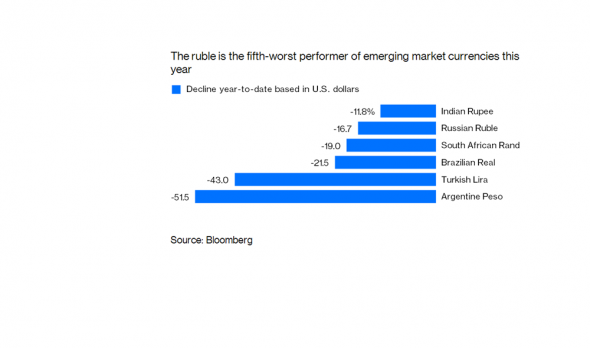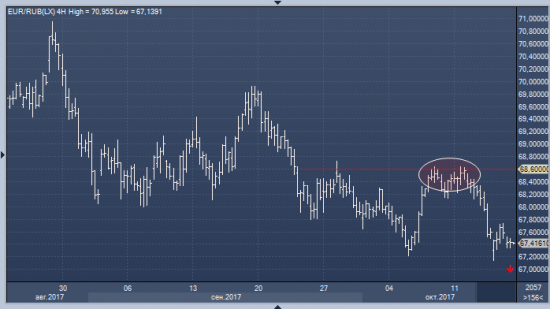Блог им. Marek |Bloomberg: Американские сенаторы "устали" от антироссийских санкций
- 08 апреля 2019, 13:07
- |

New Russia Penalties Face ‘Sanctions Fatigue’ in U.S. Congress
8 апреля2019 г. 8:01:00
Tough talk about the need to punish Russia for meddling in the 2016 U.S. election is running into the reality that Congress’s enthusiasm for additional sanctions is waning.
“We face a little bit of sanctions fatigue around here these days,” said Republican Senator Marco Rubio of Florida, the sponsor of one of the bills aimed at Russia. “Hopefully we’ll get more people on board.”
Two main proposals are circulating aimed at increasing pressure on Russian individuals and companies by restricting their access to U.S. markets and capital. Both Senate bills received significant attention in 2018 after President Donald Trump failed to condemn Russia for its election meddling, but they lost steam after November’s midterm elections and aren’t moving any faster in this year’s Congress.
Many lawmakers still want Russia to face stronger consequences for its actions in the U.S. and elsewhere, but there’s no clear consensus on how to send the right message to the Kremlin. Two other factors add to the hesitation: concern about unintended economic consequences, and the difficulty of passing legislation in a divided Congress when the measures don’t have the president’s support.
( Читать дальше )
- комментировать
- ★1
- Комментарии ( 5 )
Блог им. Marek |Пятничная статья в Bloomberg по поводу якобы санкций))) Из-за которой народ развели на рашен рынке
- 30 марта 2019, 20:02
- |

U.S. Readying Russia Sanctions for U.K. Poison Attack, Sources Say
Updated on Move is in response to 2018 nerve-agent attack on Skripal
U.S. official has said sanctions to include banking sector
2019-03-29 3:47
The White House has received a long-awaited package of new sanctions on Russia, intended to punish the Kremlin for a 2018 nerve-agent attack on a former Russian spy in the U.K.
U.S. officials at the State and Treasury departments have vetted the sanctions and are awaiting approval from the White House to issue them, according to two people familiar with the matter who discussed the internal deliberations on condition of anonymity.
The State Department said in September that it had expected to impose the financial restrictions in November. Some members of Congress argue that the sanctions are required under the 1991 Chemical and Biological Weapons Control and Warfare Elimination Act, after the Kremlin was found to be responsible for the attempted assassination of Sergei Skripal and his daughter in 2018, using a Russian-developed toxin from a class called Novichok.
( Читать дальше )
Блог им. Marek |В Bloomberg дали новые прогнозы по Bitcoin
- 19 ноября 2018, 14:58
- |

19.11.2018
Падение самой популярной криптовалюты только начинается, а стоимость может опуститься с $5,5 тыс. до $1,5 тыс.
Такой прогноз озвучили Bloomberg Intelligence, передает одноименное издание. Эксперт Майк Макглоун считает, что две версии Bitcoin Cash продолжат отвлекать ресурсы инвесторов и майнеров, вызывая снижение котировок рынка.
“Аналитики прогнозируют, что цена может упасть до $1500, что будет означать еще одно падение более чем на 70 процентов от текущих уровней”, – пишет издание.
Блог им. Marek |Bloomberg: Российские миллиардеры стали лидерами по росту состояния в 2018 году
- 22 октября 2018, 17:54
- |

20.10.2018
Вопреки американским санкциям, совокупное состояние десяти богатейших россиян с начала 2018 года стало крупнейшим среди миллиардеров других стран мира. Такие данные приводит агентство Bloomberg.
“По данным Bloomberg Billionaires Index, 10 самых богатых людей в России больше всего приумножили свое состояние, начиная с начала года, по сравнению с любыми другими миллиардерами во всем мире”, – говорится в сообщении.
Как отмечается, их совокупное состояние увеличились на 10,8%. На втором месте – американские миллиардеры. Доход десяти самых богатых бизнесменов США, по оценке Bloomberg, с начала года вырос на 7,5%. За ними следуют британские миллиардеры, которые увеличили совокупное состояние на 3,4%, пишет агентство.
Другим участникам рейтинга увеличить состояние не удалось. Совокупное состояние десяти французских миллиардеров уменьшилось на 0,8%, шведских – на 4,6%, швейцарских – на 5,4%. Наихудший результат показали десять самых богатых китайских бизнесменов – их совокупное состояние сократилось на 27,6%.
Новости рынков |Bloomberg: Цены на нефть смягчают удар антироссийских санкций
- 30 сентября 2018, 19:43
- |

Oil's Leap Toward $100 Softens the Blow of Russia Sanctions
Скачок цен на нефть до $100 смягчает удар антироссийских санкций
28.09.2018
Когда бывший президент США Барак Обама в 2014 году впервые ввел санкции против России, из-за резкого падения мировых цен на нефть эти меры превратились в сокрушительный удар. На этот раз нефтяные рынки оказывают противоположное влияние.
Пока американские законодатели обдумывают новый раунд «сокрушительных» санкций, некоторые трейдеры предсказывают, что цена на основную статью экспорта России впервые с 2014 года достигнет 100 долларов за баррель. Неожиданный рост доходов от продажи нефти может в конечном итоге смягчить последствия даже самых жестких санкций, обсуждаемых в Вашингтоне, и на фоне подъема нефтяных котировок инвесторы приобретают российские гособлигации.
«Скачок цен на нефть должен нивелировать страх перед санкциями, — говорит Viktor Szabo, портфельный менеджер инвестиционной и страховой компании Aberdeen Standard Investments в Лондоне. — Россия по фундаментальным показателям является одной из сильнейших на развивающихся рынках».
Из-за новых угроз США ввести санкции российские акции оказались среди худших по динамике на фоне падения развивающихся рынков этим летом в целом, но последующее оживление цен на нефть и поддержка рубля Центробанком способствовали восстановление курса акций. Тем временем в Вашингтоне американские законодатели продолжают грозить санкциями, которые могут привести к запрету на осуществление операций с новым российским суверенным долгом и даже к исключению российских банков из международной финансовой системы.
Сильная позиция
( Читать дальше )
Блог им. Marek |В буре развивающихся рынков, смотрите на Россию
- 07 сентября 2018, 14:31
- |

In the Emerging Market Storm, Look to Russia
В буре развивающихся рынков, смотрите на Россию
Bloomberg: У России осталось еще много способов защитить рубль
07.09.2018
Рубль подхватило отливом, начавшимся на ее охваченном кризисом формирующемся валютном рынке. Российская валюта, упавшая за этот год по отношению к доллару почти на 17%, после того, как российский премьер-министр Дмитрий Медведев в четверг призвал центральный банк снизить процентные ставки для стимуляции роста, подешевела до уровня, на котором она была два с половиной год назад.

( Читать дальше )
Новости рынков |Bloomberg: евро/рубль нацелен на снижение к 65,19 руб.
- 17 октября 2017, 16:09
- |

17.10.17 16:03
«На прошлой неделе евро/рубль предпринял несколько неудачных попыток прорваться выше ключевой зоны сопротивления около 68.60, после чего пара опустилась ниже основания дневного облака Ишимоку (68.48) и 100-дневной МА (68.18)», — пишет технический аналитик Bloomberg Седжул Гокал. — «Теперь, когда евро/рубль торгуется ниже всех компонентов облака Ишимоку, технической целью дальнейшего снижения является область прохождения 200-дневной МА (65.19). Впрочем, определенную угрозу для покупателей российской валюты представляет агрессивный рост бычьих настроений, спровоцированный недавним взлетом цен на нефть».

( Читать дальше )
Новости рынков |Опрос Bloomberg: налоговые платежи РФ в октябре могут составить 1.5 трлн. рублей
- 13 октября 2017, 17:28
- |

13.10.17 12:09
Агенство Bloomberg на основании проведенного среди ряда банков опроса, утверждает, что объем платежей в рамках октябрьского налогового периода может составить 1.5 трлн. рублей. В опросе участвовали: Росбанк, Уралсиб, Промсвязьбанк, Банк Зенит, Райффайзенбанк, ING.
Платежи по НДПИ (налог на добычу полезных ископаемых) могут составить 327 млрд. рублей (до 25 октября)
Акцизный налог может достигнуть 113 млрд. рублей (до 25 октября)
Платежи по НДС (налог на добавленную стоимость) могут составить 336 млрд. рублей (до 25 октября)
Налог на прибыль — 275 млрд. рублей (до 30 октября)
Индивидуальный подоходный налог — 513 млрд. рублей (до 16 октября)
Курс рубля при прочих равных обстоятельствах обычно демонстрирует активные попытки роста в рамках налогового периода, поскольку компании формируют повышенный спрос на рублевую ликвидность.
- bitcoin
- brent
- eurusd
- forex
- gbpusd
- gold
- imoex
- ipo
- nasdaq
- nyse
- rts
- s&p500
- si
- usdrub
- wti
- акции
- алготрейдинг
- алроса
- аналитика
- аэрофлот
- банки
- биржа
- биткоин
- брокеры
- валюта
- вдо
- волновой анализ
- волны эллиотта
- вопрос
- втб
- газ
- газпром
- гмк норникель
- дивиденды
- доллар
- доллар рубль
- евро
- золото
- инвестиции
- индекс мб
- инфляция
- китай
- кризис
- криптовалюта
- лукойл
- магнит
- ммвб
- мобильный пост
- мосбиржа
- московская биржа
- мтс
- нефть
- новатэк
- новости
- обзор рынка
- облигации
- опрос
- опционы
- отчеты мсфо
- офз
- оффтоп
- прогноз
- прогноз по акциям
- путин
- раскрытие информации
- ри
- роснефть
- россия
- ртс
- рубль
- рынки
- рынок
- санкции
- сбер
- сбербанк
- северсталь
- сигналы
- смартлаб
- сущфакты
- сша
- технический анализ
- торговля
- торговые роботы
- торговые сигналы
- трамп
- трейдер
- трейдинг
- украина
- фондовый рынок
- форекс
- фрс
- фьючерс
- фьючерс mix
- фьючерс ртс
- фьючерсы
- цб
- цб рф
- экономика
- юмор
- яндекс


















